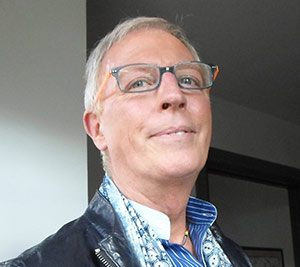WASHINGTON –– One day in early September, Washington resident Yayo Grassi was interrupted by a mysterious phone call while working in his backyard.
 Yayo Grassi (CNS photo/James Martone)“I was watering my plants and the cellphone rings, and it says ‘caller is not in your contacts,'” Grassi recounted recently from his house in Washington.
Yayo Grassi (CNS photo/James Martone)“I was watering my plants and the cellphone rings, and it says ‘caller is not in your contacts,'” Grassi recounted recently from his house in Washington.
“So I pick up the phone, and I say ‘hello,’ and this voice says, ‘Hello, is Obdulio there?'” he continued.
The only person who ever referred to him by that nickname was his high school literature teacher of some 50 years ago in Argentina — Jorge Mario Bergoglio, now Pope Francis.
Grassi said he had emailed his former teacher soon after learning of the pope’s September visit to the United States, but he never expected a call. In the email, he said, he told the pope how much he would like to see him but knew it probably would not be possible due to the pontiff’s intense U.S. itinerary.
When he heard the voice on the phone, “it dawned on me … he’s calling me from Italy,” the 67-year-old Grassi said he suddenly realized.
Grassi said he and Pope Francis spent the next 15 minutes on the phone, discussing Cuba, politics, religion and a joint admiration for U.S. President Barack Obama.
“And one of the first things (the pope) said is, ‘If you have the time I would love to give you a hug in Washington,'” Grassi relayed in the Oct. 6 interview with Catholic News Service.
Three weeks after that call from Rome, Grassi, who is openly gay, was making international and local headlines for a now widely publicized audience he and several of his friends – including his Muslim partner of 19 years – were granted with Pope Francis in Washington.
The encounter was one of several meetings that have taken place over the years between Grassi and the man who is now pope, both the Vatican and Grassi confirm.
“I don’t want to be that pretentious,” said the latter, shrugging off the notion that any of the meetings suggest a tilt in the favor of same-sex marriage, which the church opposes.
Grassi, who moved to Washington from Argentina in 1978, seemed rather to view the encounters more as a natural consequence of the pope’s “kindness” and “superior mind,” which Grassi said had allowed the pontiff, a fellow Argentine, to teach and relate to him and the other students at their Catholic high school half a century ago, when the pope was a seminarian in Santa Fe, Argentina.
“He was the person that I would go to if I had a problem, and we were talking one day and he said to me, ‘You have to dress with the skin of your fellow man if you want to feel their pain,'” Grassi said the future pope told him.
Cardinal Bergoglio had also challenged him and the other students to think more broadly, by introducing them all to Argentina’s contemporary writers, instead of just the classics, “because they relate to you in a way that is different,” Grassi quoted his former teacher as stating.
Grassi, a self-declared atheist, said he lost contact with his teacher soon after high school until 2008, when they finally met up again in Buenos Aires. He remembered asking then-Cardinal Bergoglio what he thought about attempts to legalize same-sex marriage in Argentina.
“He said, ‘I am the pastor of the church and therefore I have to follow the teachings of the church, but I am also a human being, so that separation is sometimes conflicted,'” Grassi said Cardinal Bergoglio told him.
Then, in 2010, Grassi said he was in contact with Cardinal Bergoglio once again, this time by email and in reaction to anti-gay marriage statements attributed to the cardinal in Argentina’s press.
“I said you have formed the most progressive and most open thoughts in my life, you have given me such a complete different view of the world … so you will think this is a strange way to thank you — to tell you I was very disappointed with your posture on gay marriage,” Grassi wrote to Cardinal Bergoglio.
The cardinal wrote back, saying his words had been taken out of context and assuring “that in my pastoral work, there is no place for homophobia,” Grassi quoted.
As if to prove that point, Pope Francis invited Grassi and his partner to a special section of St. Peter’s Square in 2013, so that the pontiff could personally greet the two amid the thousands of other visitors, Grassi reported.
“I remember walking through St. Pietro and saying to my boyfriend, ‘Do you realize that this must be the first time in the history of the Catholic Church that a pope receives knowingly an atheist-Muslim gay couple,'” Grassi said, laughing.
